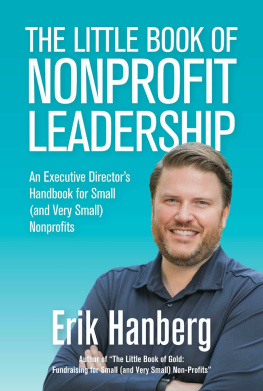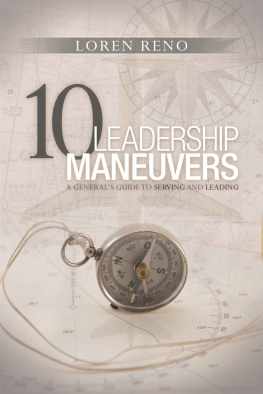Praise for The Art of Leadership
The best way to learn something is not to be taught a lessonits to be told a story . Human beings crave good stories, and Michael Lopp is a natural-born storyteller.
John Gruber, Writer, Daring Fireball
Small Things, Done Well is packed with real-world experience and practical actions that you can act on today to help become a better leader.
Cal Henderson, Cofounder and CTO, Slack
Lopp has delivered the book your team desperately wants you to read.
Michael Sippey,Chief Product Officer, Medium
Like watching an athlete at the top of her game, you can spot excellence, but hidden from obvious view is the winding journey of hard-earned skills that got her there. With Small Things, Lopp shares his leadership journey and the secret menu of tips to guide you along the way.
Julia Grace,Director of Engineering, Apple
In a sea of leadership advice which waxes philosophical and theoretical, Michael Lopps Small Things, Done Well offers actionable advice you can use daily .
April Underwood,Cofounder #Angels and former Chief Product Officer, Slack
With heart and charm, Lopp delivers an essential quick-start manual for leadership .
Joshua Goldenberg, VP Design at Loom
A timely and pragmatic read full of hard-earned advice focused on helping you become a better leader .
Eric Poirier,Chief Executive Officer, Addepar
The Art of Leadership
by Michael Lopp
Copyright 2020 Michael Lopp. All rights reserved.
Printed in the United States of America.
Published by OReilly Media, Inc. , 1005 Gravenstein Highway North, Sebastopol, CA 95472.
OReilly books may be purchased for educational, business, or sales promotional use. Online editions are also available for most titles (http://oreilly.com). For more information, contact our corporate/institutional sales department: 800-998-9938 or corporate@oreilly.com .
- Acquisitions Editor: Melissa Duffield
- Development Editors: Alicia Young, Nicole Tach
- Production Editor: Katherine Tozer
- Copyeditor: Rachel Head
- Proofreader: Rachel Monaghan
- Indexer: Judith McConville
- Interior Designer: Monica Kamsvaag
- Cover Designer: Randy Comer
- Illustrator: Rebecca Demarest
Revision History for the First Edition
- 2020-05-13: First Release
See http://oreilly.com/catalog/errata.csp?isbn=9781492045694 for release details.
The OReilly logo is a registered trademark of OReilly Media, Inc. The Art of Leadership, the cover image, and related trade dress are trademarks of OReilly Media, Inc.
The views expressed in this work are those of the author, and do not represent the publishers views. While the publisher and the author have used good faith efforts to ensure that the information and instructions contained in this work are accurate, the publisher and the author disclaim all responsibility for errors or omissions, including without limitation responsibility for damages resulting from the use of or reliance on this work. Use of the information and instructions contained in this work is at your own risk. If any code samples or other technology this work contains or describes is subject to open source licenses or the intellectual property rights of others, it is your responsibility to ensure that your use thereof complies with such licenses and/or rights.
978-1-492-04569-4
[LSI]
Dedication
To Rachelle.
Neither I nor you,
But us.
Foreword
Whenever I hired a new engineer at Instagram, I would tell them: Welcome! This is now officially the biggest team Ive ever managed. Scaling Instagrams engineering team from 2 to 500 in just a few years necessitated a crash course in the principles, behaviors, and habits that make for successful teams and helpful managers. During that time I was a sponge, absorbing advice from coaches, books, articles. Top of my sponge list? Reading Lopps books and articles, and later getting thoughts from the man himself.
Those years of building out the team taught me that management is fundamentally about uncovering informationroadblocks your team is facing, interpersonal friction, etc.and then slicing through the BS to find the right way forward. Doing it well means getting good at both of those. On the information front, it means asking the right questions and designing an intentional culture that fosters truth telling. In terms of finding a path forward, it means learning about the universe of possible solutions and then choosing the best one for the particular situation.
Thats the what; Lopp is here to show us the how. And the how is a continuous process of self-improvement built by understanding, adopting, and refining the right habits and practicesthe small things, done well.
The first time you try out a new management nuggetone of Lopps small thingsitll probably feel a little uncomfortable, like a new shirt that hasnt yet been tailored. Your team might wonder if youre trying something you just read in a book (which, in fact, you are). But you push through the awkwardness, until the behaviors become second nature, and then the magic happens where you add your own twist on them and make them your own.
I can think of no better way to build the management muscle than that. So, to my 2010 self: sorry, I wish youd had this book. But to you, reading this now: enjoy the ride.
Mike Krieger
Former CTO at Instagram
Introduction
This is a book full of small things. Simple, memorable leadership acts and practices that Ive gathered and refined over the years.
Heres my favorite: Ive preached 1:1s, weekly recurring meetings with direct reports, for decades. I believe a 1:1 represents the simplest and most reliable way to build trust between you and your coworkers, by providing a weekly high-bandwidth conversation on current events affecting the team. 1:1s are the first meeting I schedule when I show up at a new gig and they are the last meeting Ill reschedule or cancel during busy times. 1:1s have been my team-building go-to move for years.
Whered this belief come from? Why do I think theyre so important? I discovered 1:1s at Netscape in the mid-1990s. A recurring weekly meeting with the boss. It was a thing that managers did, but that didnt make them relevant. Just work that I was supposed to do, so I scheduled them.
Months and years passed, and I dutifully did my 1:1s. A habit? Perhaps a better term to describe whats contained inside this book would be leadership habitssmall acts, repeated over time until they become second nature. There is an intersection between my list of small things and habits, but youre not going to learn from these practices just by having them become second nature.
What I discovered after hundreds of 1:1s was that these meetings presented the highest signal of the week. Real conversations about the important topics that week. Critical bidirectional conversations revealing information that I have found no other reliable way of discovering.
My belief in 1:1s, the reason I schedule them for 30 minutes, every week, no matter what, is because Ive now done thousands of them. Ive learned how to always productively fill the time, I know how to get the curmudgeonly engineer to appreciate them, I know what to do when they go sideways, and I have a good idea whats up when someone declines them without reason. They are a habit, but the habit isnt what taught me that 1:1s are importantit was the compounding value of the experience gained performing each one.
I learned that 1:1s are the single best way to build professional trust and respect with your teambut you wont truly believe me until youve done a couple hundred of them and seen the results for yourself.











